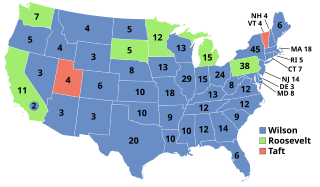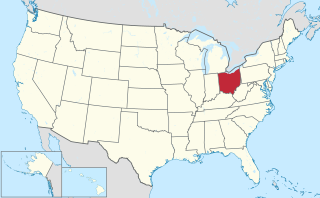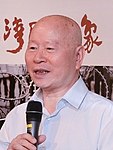
The 1912 United States presidential election was the 32nd quadrennial presidential election, held on Tuesday, November 5, 1912. Democratic Governor Woodrow Wilson of New Jersey unseated incumbent Republican President William Howard Taft while defeating former President Theodore Roosevelt and Socialist Party nominee Eugene V. Debs.

The 1924 United States presidential election was the 35th quadrennial presidential election, held on Tuesday, November 4, 1924. In a three-way contest, incumbent Republican President Calvin Coolidge won election to a full term. Coolidge was the second vice president to ascend to the presidency and then win a full term. The first one was Theodore Roosevelt.

The 1936 United States presidential election was the 38th quadrennial presidential election, held on Tuesday, November 3, 1936. In the midst of the Great Depression, incumbent Democratic President Franklin D. Roosevelt defeated Republican Governor Alf Landon of Kansas. Roosevelt won the highest share of the popular vote (60.3%) and the electoral vote since the largely uncontested 1820 election. The sweeping victory consolidated the New Deal Coalition in control of the Fifth Party System.
Third party is a term used in the United States for political parties other than the two major parties.
The All Nigeria Peoples Party (ANPP) was a political party in Nigeria.

The Peoples Democratic Party [sic] is one of the two major contemporary political parties in Nigeria, along with its main rival, the All Progressives Congress.
The Liberal Party of Cuba, was one of the major political parties in Cuba from 1910 until the Cuban Revolution in the late 1950s, when it was exiled.

Elections in Nigeria involve choosing representatives to the federal government of Nigeria and the various states in the fourth republic Nigeria. Elections in Nigeria began in 1959 with a number of political parties. It's a method of choosing leaders where the citizens have right to vote and to be voted for. For 2023, Nigerians are getting ready for presidential elections with about 93.4 million eligible voters across the federation for the 25 February election.

The United People's Party (UPP) is a political party in Liberia. It formed in the 1980s as a successor to the Progressive Alliance of Liberia (PAL) and the Progressive People's Party (PPP), but was initially banned under President Samuel Doe because of its "socialist leanings".

The Action Congress of Nigeria (ACN), formerly known as Action Congress (AC), was a Nigerian political party formed via the merger of a faction of Alliance for Democracy, the Justice Party, the Advance Congress of Democrats, and several other minor political parties in September 2006. The party controlled Lagos. It was regarded as a natural successor to the progressive politics more closely associated with the Action Group and Unity Party of Nigeria (UPN) led by Chief Obafemi Awolowo in the First and Second Republics respectively. However, criticism of the party's more pragmatic and less ideological political outlook associated with AG and UPN, has made many argue it was less of a worthy political heir. The Party had strong presence in the South West, Mid-West and North Central Regions. Lagos, Edo, Ekiti, Kogi, Ondo, Bauchi, Plateau, Niger, Adamawa, Oyo and Osun states by far accounts for majority of the party's presence and discernible power base.

The Fourth Republic is the current republican government of Nigeria. Since 1999, it has governed the country according to the fourth republican constitution. It was in many ways a revival of the Second Republic, which was in place between 1979 and 1983 and suffers many of the same problems, such as multiple ministries which made policy planning difficult. Nigeria adopted the constitution of the Fourth Republic on 29 May 1999.

The Oregon Progressive Party is a political party in the U.S. state of Oregon. Originally called the Oregon Peace Party, it was accepted as the sixth minor statewide political party in Oregon on August 22, 2008. This allowed the party to nominate Ralph Nader as its candidate in the 2008 U.S. presidential election. In September 2009, the party changed its name to the Oregon Progressive Party, to "more accurately reflects the party's positions" on issues besides peace, including "social justice, consumer advocacy, environmental protection, and worker's rights."

Elections in Vermont are authorized under Chapter II of the Vermont State Constitution, articles 43–49, which establishes elections for the state level officers, cabinet, and legislature. Articles 50–53 establish the election of county-level officers.

The 1948 United States presidential election in New York took place on November 2, 1948. All contemporary 48 states were part of the 1948 United States presidential election. Voters chose 47 electors to the Electoral College, which selected the president and vice president.

The 1912 United States elections elected the members of the 63rd United States Congress, occurring during the Fourth Party System. Amidst a division between incumbent Republican President William Howard Taft and former Republican President Theodore Roosevelt, the Democratic Party won the presidency and both chambers of Congress, the first time they accomplished that feat since the 1892 elections.

Following is a table of United States presidential elections in Ohio, ordered by year. Since its admission to statehood in 1803, Ohio has participated in every U.S. presidential election.

The 1932 United States presidential election in Minnesota took place on November 8, 1932 as part of the 1932 United States presidential election. Voters chose 11 electors, or representatives to the Electoral College, who voted for president and vice president.

The 1912 United States presidential election in Maine took place on November 5, 1912, as part of the 1912 United States presidential election which was held throughout all contemporary 48 states. Voters chose six representatives, or electors to the Electoral College, who voted for president and vice president. Maine was won by the Democratic nominees, New Jersey Governor Woodrow Wilson and Indiana Governor Thomas R. Marshall. Wilson and Marshall defeated incumbent President William Howard Taft, and his running mate Vice President James S. Sherman and Progressive Party candidates, former President Theodore Roosevelt and his running mate California Governor Hiram Johnson.

The 1916 United States presidential election in Illinois was held on November 7, 1916, as part of the 1916 United States presidential election. State voters chose 29 electors to the Electoral College, who voted for president and vice president.
The Young Progressives Party (YPP) is a social-democratic political party in Nigeria. The party was created to challenge the two major contemporary parties in Nigeria, the People's Democratic Party and the All Progressives Congress. In its manifesto, it called for concerted efforts to improve welfare, fight for social justice and provide equality of opportunities for all citizens in Nigeria. The Young Progressive Party won one seat out of the 109 seats in the Nigerian Senate during the 2019 general elections.

















